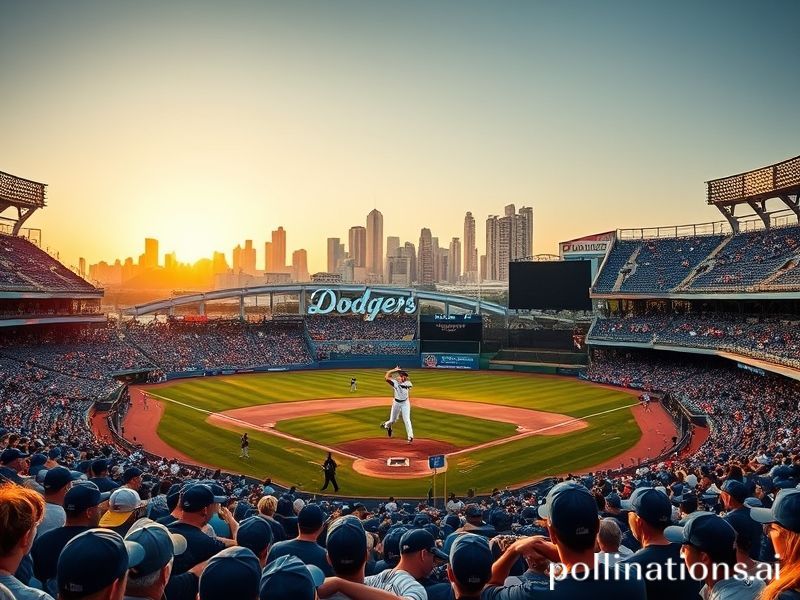Global Game, Local Catastrophe: How Tonight’s Dodgers Match Quietly Became the World’s Most-Watched Metaphor
Dodgers vs. the Planet: How a Wednesday Night in Chavez Ravine Quietly Became a Referendum on Everything
By the time the first pitch slices through the Los Angeles smog at 7:10 p.m. local time—an hour that translates, depending on your longitude, to the wrong side of dawn in Seoul, elevenses in London, and that awkward lull in Lagos when the generator fuel runs out—the Dodgers will already be playing for stakes far larger than the NL West. Today’s game is nominally against the Cincinnati Reds, a franchise whose greatest export this season appears to be existential dread disguised as rebuilding. Yet the real opponent is more nebulous: the entire rest of the globe, watching to see whether a $4.8-billion sports-industrial complex can still sell hope nine innings at a time.
Consider the international audience metrics. MLB.tv’s geolocation tracker pings active streams in 183 countries, which is 25 more than the number that bothered to vote on last year’s UN resolution condemning plastic straws. In Taiwan, office workers huddle over burner phones to dodge strict anti-gambling firewalls, wagering New Taiwan dollars on whether Mookie Betts’ hamstring will hold. Meanwhile, a bar in Reykjavik—population roughly equal to the Dodger Stadium parking lot on bobblehead night—legally streams the broadcast via a loophole classifying baseball as “educational programming about American pastoralism.” Somewhere in Siberia, a man who has never seen grass that wasn’t on fire is wearing a Cody Bellinger jersey he bought from a Vladivostok kiosk that also sells counterfeit insulin. Globalization is beautiful until you look closely.
The game’s geopolitical undercard begins with Shohei Ohtani’s at-bats, each swing a miniature trade summit. Every 450-foot homer boosts Japan’s quarterly soft-power index by 0.3%, according to an economist at the University of Tokyo who definitely didn’t receive a grant from the Ministry of Cool. When Ohtani strikes out, Twitter in Osaka briefly trends the phrase “reverse Pearl Harbor,” proving that historical baggage travels faster than a 101-mph fastball. Across the Pacific, U.S. cable pundits debate whether his interpreter should be required to register as a foreign agent, because nothing says “post-truth politics” like dragging baseball into congressional hearings.
Then there’s the sticky matter of the ball itself—manufactured in a factory in Costa Rica where workers earn $1.25 per hide, roughly the price of a Dodger Dog before stadium markup. Each sphere crosses more borders in its short life than the average European passport holder. The cow was raised in Iowa, the leather tanned in Italy, the yarn spun in Taiwan, the final stitch sewn by hands that will never afford a ticket to see the finished product in action. Economists call this “supply-chain efficiency.” The rest of us call it the reason we can’t have nice things without moral vertigo.
Back in the stands, the crowd demographics tell their own ironic story. Luxury boxes overflow with crypto refugees from nations where blockchain promised liberation but delivered only different oligarchs. Down in the bleachers, undocumented vendors hustle $15 micheladas to fans who simultaneously decry “open borders” while sipping imported lager. Everyone, regardless of citizenship, unites in booing the visiting pitcher, a ritual more functional than the UN Security Council and only slightly less drunk.
By the eighth inning, the score will matter less than the trending hashtags. If the Dodgers win, Los Angeles momentarily forgets its housing crisis and pretends the city’s soul isn’t mortgaged to Netflix. If they lose, sports-talk radio will demand the manager’s head on a platter, preferably sustainable bamboo. Either way, the broadcast cuts to a commercial for fighter jets, because nothing pairs with pastoral nostalgia like Lockheed Martin.
When the final out lands in the glove and the stadium lights dim, the planet keeps spinning—tilted, overheating, but still vaguely amused by our need to reduce cosmic anxiety to box scores. Somewhere a child in Nairobi sells a hand-drawn Freddie Freeman card for the equivalent of a bus fare. Somewhere else a hedge-fund algorithm shorts the team’s parent company because a utility player tweaked an oblique.
Baseball, they insist, is just a game. Tell that to the global supply chain, the offshore bank accounts, and the screaming bar in Reykjavik that just ran out of beer. Tell it to yourself, quietly, as you refresh the score on your phone at 3 a.m. local time, wondering why a team named after trolley-dodgers in 1880s Brooklyn now feels like the last shared hallucination we’ve got left.







